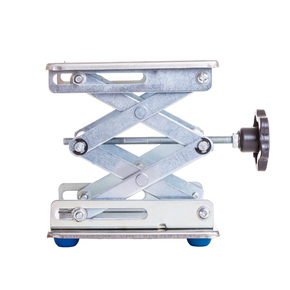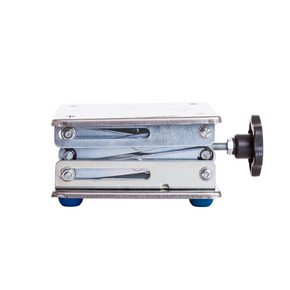A Lab Chain Holding Support is a specialized piece of laboratory equipment used to secure and support various items, such as flasks, condensers, or other glassware, during experimental procedures. It is typically used in setups where equipment needs to be suspended, held in place, or securely attached to a fixed point to prevent movement or accidents.
Key Features and Characteristics:
1. Chain and Hook Mechanism:
- The lab chain is a metal or nylon chain designed to be flexible yet strong enough to hold laboratory glassware or other apparatus. The chain can be adjusted to different lengths, allowing for flexibility in positioning the equipment.
- Hooks or attachment points at either end of the chain or along its length are used to hang or support laboratory glassware. These hooks are made of metal (often stainless steel) and have features that make them safe and easy to attach to glassware or other items.
2. Material:
- The chain is often made from stainless steel or high-strength nylon, both of which are durable and resistant to chemical corrosion and wear. Stainless steel offers greater strength, while nylon may be chosen for its non-reactivity and flexibility.
- The hooks or supports are made from metal (stainless steel) to ensure strength and durability, especially for heavy items like large flasks or condensers.
3. Function:
- The Lab Chain Holding Support is used to suspend or secure laboratory glassware, ensuring that items like flasks, condensers, burettes, or reflux columns stay in place during chemical reactions, distillation, or other processes.
- It prevents glassware from tipping over, falling, or getting displaced during experiments, thus improving safety and stability.
- In distillation setups, for example, a lab chain holding support can hold a distillation flask or a condenser in place, reducing the risk of accidents and maintaining the correct alignment during the distillation process.
4. Adjustability:
- Many lab chain holding supports are adjustable, allowing users to change the length or tension of the chain as needed. This feature provides flexibility in adjusting the height or positioning of the supported equipment.
- Some models feature sliding clips or adjustable loops that allow the chain's length to be changed without disassembling the support system. This is particularly useful in setups where the height or positioning needs to be altered during the course of an experiment.
5. Attachment Points:
- The support features one or more attachment points (such as hooks, clips, or carabiner-like fasteners) that can be connected to the chain and used to hold equipment securely.
- The attachment points are designed to fit onto various types of laboratory glassware, with the hooks or clips often sized to accommodate specific lab items (e.g., flask necks, condenser arms, or burettes).
6. Safety and Stability:
- The lab chain holding support helps ensure the stability of laboratory glassware, which is crucial in preventing accidents or breakages. For instance, during distillation, glassware may be subjected to high temperatures, and a lab chain holding support ensures that the glassware remains in place, even if external forces (such as vibration or shifting) affect the setup.
- In some setups, especially when working with vacuum or pressure, securing glassware with a lab chain holding support adds an additional layer of safety, ensuring that nothing becomes loose or displaced.
7. Versatility:
- Lab chain holding supports are versatile and can be used in a variety of laboratory setups:
- Distillation: Holding distillation flasks, condensers, or receiving flasks in place during the distillation process.
- Reflux: Securing reflux apparatus, such as condensers and reaction flasks, during heating.
- Titration: Supporting burettes or other graduated glassware to ensure stability during titration.
- Extraction: Holding various glassware or containers in place during liquid-liquid extraction or other processes.
8. Ease of Use:
- Lab chain holding supports are typically easy to use and can be quickly adjusted or removed when necessary. They allow for efficient setup and reconfiguration of experimental systems without requiring extensive modifications or equipment changes.
- The chain can be attached to a retort stand, lab frame, or other stable supports, providing a solid base for securing laboratory apparatus.
9. Size and Configuration:
- Lab chain holding supports come in various sizes to accommodate different setups and levels of weight support. Some models are designed for use with smaller glassware, like test tubes or burettes, while others can hold larger equipment like reaction flasks, distillation columns, or condensers.
- The chain length can vary based on the size of the equipment it is meant to support, and the support's strength and weight capacity are important considerations when choosing the appropriate chain and hook system.
Summary:
A Lab Chain Holding Support is a versatile and essential piece of equipment used in laboratory settings to secure and stabilize glassware and other apparatus during experiments. The support typically consists of an adjustable chain made of durable material (like stainless steel or nylon) with hooks or clips to attach the equipment securely. It ensures that items such as distillation flasks, condensers, burettes, and reaction vessels remain in place during chemical reactions, distillation, or other procedures. The lab chain holding support contributes to safety, stability, and precision, making it an important tool for maintaining proper alignment and reducing the risk of breakage or displacement during experiments.



